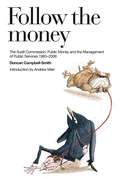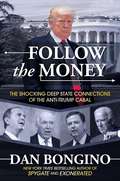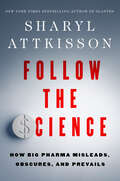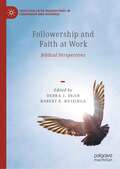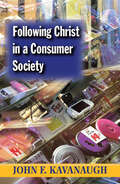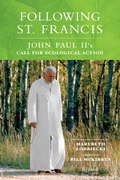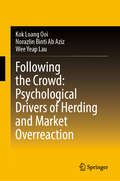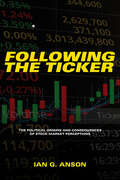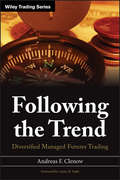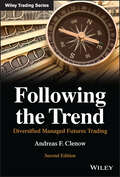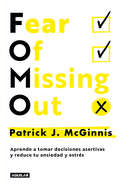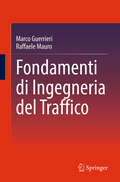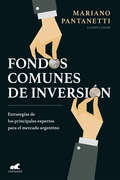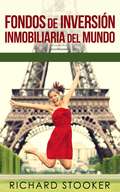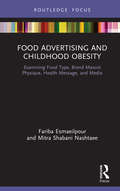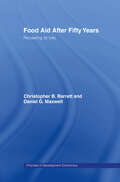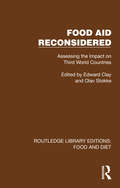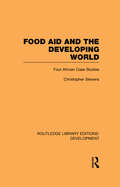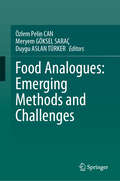- Table View
- List View
Follow the Money: A History of the Audit Commission
by Duncan Campbell-SmithMost books on politics and government take a view from the top down. They focus on the individuals and institutions that set policies in place and make the laws. But how are these policies and laws translated into action on the ground, where their success or failure helps determine the day to day running of schools and hospitals, police forces and councils? This is the much less familiar territory explored by Follow The Money. It tells the story of the men and women responsible for keeping track of the money spent locally on public services since the early 1980s. What emerges is a rare behind-the-scenes account of the political world in which central government edicts come up against the reality of how things are made to happen at the grass roots. Follow The Money shows how the Commission has helped over 25 years to transform the management of public services, including the NHS, while mediating in an often tense relationship between central and local government from the Thatcher era to the years of New Labour. The result, encompassing a string of scandals and battles between town hall and Whitehall, is a compelling narrative for which an accounting qualification is most certainly not required.
Follow the Money: The Shocking Deep State Connections of the Anti-Trump Cabal
by Dan BonginoAs seen on The Ben Shapiro Show! Follow the Money exposes the labyrinth of connections between D.C.&’s slimiest swamp creatures—Democrat operatives, lying informants, desperate and destructive FBI agents, Obama power brokers, CIA renegade John Brennan, George Soros, and more—who conspired to attack Trump by manufacturing one bogus scandal after another.Bestselling author, podcast favorite, and Fox News contributor Dan Bongino delivers the third and most shocking of his acclaimed series chronicling the Deep State war against Donald Trump. Starting with the Trump impeachment hearings, Bongino works forward and backward to piece together the connections of a vast, well-funded cabal of wealthy Democrats and D.C. swamp elite to the non-stop deluge of manufactured scandals launched specifically to attack, destabilize, and ultimately remove Trump and his administration. Zooming in on Ukraine, Bongino unspools a complex sequence of corruption—from the miraculous &“discovery&” of a mysterious black ledger that linked financial transactions to Trump campaign insider Paul Manafort and cast a shadow over the entire Trump team, to Joe Biden&’s unexamined quid pro quo interference with Kyiv politics as he threatened to withhold a loan unless a prosecutor was removed from office. The former Secret Service agent exposes how Glenn Simpson, the corrupt cheerleader behind the lie-filled Steele dossier, wrangled millions from top Democrat donor George Soros to meddle in Ukraine politics. Bongino also reveals Soros&’s desperate multimillion-dollar plan to stop Trump&’s re-election. Using FBI documents, Bongino reveals the outrageous actions of Robert Mueller&’s investigators, who sat on evidence that proved the supposedly damning Trump Tower meeting between a Russian lawyer and senior campaign officials was nothing more than a twenty-minute waste of time for all involved. Other chapters delve into the disturbing presence of Obama&’s fixer, obstruction angel Kathryn &“Kathy&” Ruemmler, who represents a rogues gallery of Russiagate political operatives; the FBI&’s inside source on the National Security Council, Anthony Ferrante, who dedicated himself to the fruitless task of trying to prove the Steele dossier was legitimate; and &“Special Agent 1&” Stephen M. Somma&’s curious obsession with Lt. Gen. Michael Flynn, which was stoked by a Flynn-fixated paid operative named Stefan Halper. Flynn is the centerpiece of one of the book&’s most revealing chapters, in which Bongino deconstructs the FBI&’s elaborate takedown of Trump&’s National Security Advisor, revealing how and why the three-star general was set up not once…but three times. Bongino also returns to the last, desperate attempt to derail Trump—the impeachment trial—and uncovers Adam Schiff&’s lies and the Ukraine-call whistleblower&’s multiple secret ties to never-Trumpers and Schiff himself. In the final chapter, Bongino unveils the newest front to stop Trump: the unleashing of COVID-19 from China and how the disease mutated from a killer plague in Wuhan to a weapon to destroy America&’s economy and, with it, Trump&’s re-election chances. Follow the Money displays dizzying detective work from a truly relentless, passionate, and patriotic reporter. An astonishing chronicle of the relentless war to destroy Donald Trump and his administration, this exposé is a must-read for anyone who wants to unravel the most shocking and corrupt campaign to unseat a sitting president in American history.
Follow the Science: How Big Pharma Misleads, Obscures, and Prevails
by Sharyl AttkissonEmmy Award-winning investigative journalist and New York Times bestselling author Sharyl Attkisson exposes the corruption that has ruled the pharmaceutical industry for decades.Through blatant lies, deep cover-ups, and high-level collusion with government and media, Big Pharma has continuously put profits over people with dangerous results. Now, with her signature investigative rigor and uncompromising commitment to the facts, Sharyl Attkisson takes readers on an shocking journey through the dark underbelly of the pharmaceutical industry.Follow the Science recounts, in exacting detail, how far the pharmaceutical industry and its supporters in medicine, media, and government will go to protect their profits. Attkisson provides shocking examples that reveal the disturbing callousness our government, public health officials, and top researchers are capable of when it comes to the most vulnerable among us. And she explains, in a graphic sense, how some of the most trusted within our society are willing to commit life-threatening ethics violations. When caught, they circle the wagons and marshal forces to defend their bad acts and take steps to cruelly silence the injured and smear those who would expose them.This book includes exclusive, eye-opening evidence including:Financial ties between well-known vaccine promoters and the vaccine industryOutrageous collusion between the news media and Big PharmaHow Big Pharma teaches slanted information to med students and doctorsGovernment officials secretly admitting vaccines caused some cases of autismThe first child seriously injured by Covid vaccines while in Pfizer's studyThe secretive money backing seemingly independent studies and nonprofitsFollow the Science will challenge your assumptions, open your eyes, and inspire you to take action. With its powerful message of truth and justice, this book is a must-read for anyone who cares about the future of our healthcare system and their own family's health.
Follow the Sun: A Field Guide to Architectural Photography in the Digital Age
by James EwingFollow the Sun will guide you through all aspects of architectural photography, from the genre’s rich history to the exciting new approaches brought by the advent of the digital age. It explains how to use the powerful tools of digital photography while employing many of the skills and traditions of the established genre. Written to be accessible to professionals, amateurs, and students alike, this book will be useful for photographers exploring architecture as fine artists, on editorial assignments, or on commercial shoots. Key features include: • Example photographs and diagrams • Historical background of architectural photography • Advice on essential equipment • How to plan a shoot to your advantage • How to use tilt-shift lenses for architecture • Editing workflow and strategies • Interviews with architectural photographers Peter Aaron, Magda Biernat, Ty Cole, and Elizabeth Felicella.
Followership and Faith at Work: Biblical Perspectives (Christian Faith Perspectives in Leadership and Business)
by Robert B. Huizinga Debra J. DeanThis edited work expands the theory of followership by drawing on biblical examples to illustrate the role of faith in being a better follower. Building on previous scholarship, the book identifies different types of followers and explores how each type meets the needs of a leader in various scenarios. The authors analyze various principles from the lives of followers of Jesus and demonstrate how they apply to modern workplaces. Building upon the growing scholarship on workplace spirituality and organizational leadership, this book offers practical and theoretical perspectives on integrating faith at work.
Following Christ in a Consumer Society: The Spirituality of Cultural Resistance
by John F. KavanaughIn an era of fraud, corruption, and the relentless celebration of image over substance, the message of this perennial best-seller is more timely than ever. Following Christ in a Consumer Society offers a penetrating critique of the culture of consumerism, contrasted with the personalism of the Gospel. Addressing a soul-destroying culture in which "having more" has become the only measure of value, Kavanaugh reminds us of the values that truly make us human. Through the counter-cultural message of the Gospel, his book presents a diagnosis of our social ills while at the same time providing a guide back to wholeness, sanity, and spiritual health.
Following Lance Armstrong: Excellence Corrupted
by Clayton Rose Noah FisherAfter years of vigorous denials, on January 14, 2013 Lance Armstrong admitted in a television interview with Oprah Winfrey that he "doped" in each of his record seven consecutive Tour de France victories, confirming the findings a few months earlier by the US Anti-Doping Agency that he had orchestrated "a massive team doping scheme, more extensive than any previously revealed in professional sports history." Until that moment with Oprah, Armstrong had consistently and strenuously denied using performance-enhancing drugs (PEDs), blood transfusions, or other artificial enhancers to compete in the grueling, three-week race throughout France. He verbally thrashed, bullied and threatened legal action against riders, journalists, race officials, and anyone else who had suggested he had cheated. This case explores Armstrong's leadership of a corrupt culture, the extensive nature of the cheating scandal among elite athletes, the decisions taken by other riders to both support Armstrong and his scheme and ultimately to admit to cheating, and the costs borne by those associated with Armstrong. It allows for discussion of the responsibilities that leaders have to followers, and that followers have to themselves and to others.
Following St. Francis
by Marybeth Lorbiecki Bill MckibbenThe first book to present the environmental teachings of this beloved pope--the newly canonized St. John Paul--and the hopeful words of Pope Francis, thoughtfully synthesized into a complete spiritual and practical vision for the future. "The ecological crisis is a moral crisis." So said Pope John Paul II, an unexpected and fierce advocate for ecological responsibility throughout his papacy. Rather than seeing environmental concerns as "earthly" or "political," he showed that they are in fact at the heart of the covenant between human beings and their Creator. In dozens of addresses, sermons, and encyclicals, Pope John Paul II made specific recommendations on twelve interconnected ecological issues, including climate change, ocean destruction, water scarcity, poverty, the role of women, and war. He showed that each could become a source of spiritual, social, and economic transformation.Following St. Francis integrates Pope John Paul II's vision with that of St. Francis of Assisi, patron saint of ecology, and the galvanizing words of Pope Francis. Accessible and illuminating, it speaks to hearts and minds, to nonreligious readers as well as devoted Catholics, incorporating Scripture, current science, and inspiring stories of solutions and restoration. Marybeth Lorbiecki unifies and champions the late, beloved pope's view that all life issues are related and that all forms of life deserve care. And if we work with God and each other to protect them, we can "renew the face of the earth" (Psalm 104:30).From the Hardcover edition.
Following the Crowd: Psychological Drivers of Herding and Market Overreaction
by Wee Yeap Lau Kok Loang Ooi Norazlin Binti Ab AzizThis book delves into a comprehensive exploration of herding and market overreaction combining psychological insights to understand why investors follow the crowd and the investment tips of others. It delves into foundational theories of behavioral finance, examining cognitive biases and emotional factors that drive collective behavior in financial markets. Through detailed case studies, including the 1998 Long-Term Capital Management Collapse, the 2015 Chinese Stock Market Crash, and the 2021 Meme Stock Phenomenon, the book offers real-world examples of herding impacts. It discusses the role of social media and technology, such as AI and machine learning, in shaping investor behavior and provides a global perspective on market reactions across different cultures. Additionally, the book explores regulatory implications and future trends in behavioral finance, making it an essential resource for academics, finance professionals, and advanced students seeking to understand the psychological underpinnings of financial markets.
Following the Proceeds of Environmental Crime: Fish, Forests and Filthy Lucre
by Gregory RoseHuge quantities of natural resources are illegally harvested and their proceeds laundered in the Asia-Pacific region, fostering corruption and undermining environmental governance. Most illegal exploitation and pollution occurs in countries with poor governance capacities, but much of the sale for profit and money laundering occurs in mature markets with well-developed governance capacities. Their asymmetrical enforcement capacities can complement each other. This book explores ways to combat illegal fishing and logging in Asia-Pacific region by the use of cooperative legal measures, particularly anti-money laundering and confiscation of proceeds techniques. Contributors to this volume cover themes including: the nature of transnational environmental crime; patterns in laundering of illicit fish and forest products; networks for distribution of illicit products; weaknesses in current systems for assurance of the legality of products; and international legal cooperation to enforce anti-money laundering laws in relation to illicit products. In considering these topics the book explores how the innovative use of anti-money laundering measures and the seizure of criminal proceeds can as policy options to combat transnational fishery and forestry crimes. The book will be of keen interest to scholars and students of environmental law and criminal law, and excellent use for practitioners in natural resources conservation law.
Following the Ticker: The Political Origins and Consequences of Stock Market Perceptions
by Ian G. AnsonDrawing on a wide variety of empirical methodologies, including large-scale survey analysis, survey experiments, and content analyses, Following the Ticker explores the complex relationship between stock market performance and political judgments through distinctive patterns of coverage in American news media. Building an eclectic theory that explores the interplay between media agenda-setting and partisan motivated reasoning, author Ian G. Anson helps to explain why the stock market increasingly occupies the minds of Americans when they evaluate the performance of incumbent presidents. In doing so, Following the Ticker contributes to a growing literature exploring the links between public opinion and economic inequality in American society. Because "the stock market is not the economy," the increasing salience of the stock market as a source of political judgments reflects a worrying development for classic models of democratic accountability.
Following the Trend
by Andreas F. ClenowDuring bull and bear markets, there is a group of hedge funds and professional traders which have been consistently outperforming traditional investment strategies for the past 30 odd years. They have shown remarkable uncorrelated performance and in the great bear market of 2008 they had record gains. These traders are highly secretive about their proprietary trading algorithms and often employ top PhDs in their research teams. Yet, it is possible to replicate their trading performance with relatively simplistic models. These traders are trend following cross asset futures managers, also known as CTAs. Many books are written about them but none explain their strategies in such detail as to enable the reader to emulate their success and create their own trend following trading business, until now. Following the Trend explains why most hopefuls fail by focusing on the wrong things, such as buy and sell rules, and teaches the truly important parts of trend following. Trading everything from the Nasdaq index and T-bills to currency crosses, platinum and live hogs, there are large gains to be made regardless of the state of the economy or stock markets. By analysing year by year trend following performance and attribution the reader will be able to build a deep understanding of what it is like to trade futures in large scale and where the real problems and opportunities lay.Written by experienced hedge fund manager Andreas Clenow, this book provides a comprehensive insight into the strategies behind the booming trend following futures industry from the perspective of a market participant. The strategies behind the success of this industry are explained in great detail, including complete trading rules and instructions for how to replicate the performance of successful hedge funds. You are in for a potentially highly profitable roller coaster ride with this hard and honest look at the positive as well as the negative sides of trend following.
Following the Trend: Diversified Managed Futures Trading (Wiley Trading)
by Andreas F. ClenowAn up-to-date and practical roadmap for diversified futures trading using CTA fund strategies In the newly revised second edition of Following the Trend: Diversified Managed Futures Trading, renowned hedge fund founder and asset manager Andreas F. Clenow presents a systematic asset management methodology in a way that allows readers to emulate the success of CTA industry professionals. In the book, you’ll find performance and attribution details for every year between 2002 and 2021 and detailed explanations of how the markets, industry, and strategy have evolved between the publication of the first edition and today. The author also offers: Detailed discussions of whether CTA hedge funds continue to show high internal correlation and exhibit homogeneous behaviour The impact of low and negative interest rate environments, massive inflows into equity markets, and the rise of quant trading firms Explorations of the combination of different types of trading models to enhance performance, complete with rulesets and fulsome analysesA ground-breaking and thoroughly incisive examination of the commodity trading advisor industry, Following the Trend: Diversified Managed Futures Trading is an essential volume for sophisticated retail traders, day traders, private investors, investment managers, portfolio managers, and institutional investors.
Fomo: Fear of missing out
by Patrick J. McGinnis"Un libro indispensable que te ayudará a tomar decisiones enfocadas, acabar con la indecisión, reducir la ansiedad y utilizar tu tiempo de una mejor manera." -Alex Torrenegra, emprendedor, inventor y empresario, juez de Shark Tank Colombia Estás en casa un viernes por la noche, revisando Instagram, listo para ir a la cama. Ves fotos en tu timeline de una fiesta a la que te invitaron, pero a la que no fuiste. Estabas seguro cuando dijiste que no, pero ahora no puedes dejar de pensar en eso, y empiezas a sentirte peor. Tienes fomo o Fear Of Missing Out (miedo a perderte de algo). Acuñado en un artículo de la Escuela de Negocios de Harvard, fomo se ha convertido en un término global para describir la ansiedad que diezma cuando se piensa que otras personas están teniendo mejores y más satisfactorias experiencias que tú. Amplificado por el auge de las redes sociales, #FOMO se ha convertido en una crisis cultural, ¿cuál es la cura? La solución es la toma de decisiones. Aprender a sopesar los costos y beneficios de tus elecciones, priorizarlas y escuchar tus instintos es fundamental para silenciar esta sensación de fomo y a su primo menos conocido: fobo o Fear Of a Better Option (miedo a una mejor opción). Después de todo, ¿a quién no le gustaría sentirse cómodo y confiado de sus decisiones? Escrito con autoevaluaciones a lo largo del libro, FOMO: Fear Of Missing Out te ayudará a determinar y eliminar las partes de tu vida que causan más ansiedad que felicidad y a decir no con seguridad y confianza.
Fondamenti di Ingegneria del Traffico
by Raffaele Mauro Marco GuerrieriQuesto libro tratta una selezione di argomenti fondamentali dell'ingegneria del traffico utili per la progettazione e il controllo delle strutture autostradali. La trattazione è concisa, ma non trascura di esaminare gli aspetti teorici più recenti e cruciali che sono alla base di numerose applicazioni dell'ingegneria autostradale, come, ad esempio, gli aspetti essenziali del calcolo dell'affidabilità dei flussi di traffico autostradale e del controllo automatizzato dei sistemi autostradali. Per rendere questi argomenti più facili da seguire, vengono forniti numerosi esempi di applicazioni lavorative, che vengono illustrate in modo molto dettagliato. In tutti i contenuti è stato adottato uno stile intuitivo e discorsivo, piuttosto che formale.Il libro offre quindi conoscenze pratiche e aggiornate su diversi aspetti dell'ingegneria del traffico, che interessano un ampio pubblico di studenti, ricercatori, pianificatori dei trasporti, specialisti del trasporto pubblico, urbanisti e decisori.
Fondeadora
by Mitchell B. Weiss Ãlvaro RodrÃguez ArreguiNorman M ller and Ren Serrano, cofounders of Fondeadora, a Mexican "neobank," had lined up a $12.5 million in Series A funding round in 2020 only to run into a major obstacle: The lead investor was Gradient Ventures, a venture firm launched by Alphabet, Inc., and Mexican banking law would require personal financial disclosures from Alphabet's biggest owners, including Google's founders Larry Page and Sergey Brin. That would be a non-starter with them. To stay under a 5% ownership threshold, Mexican banking regulators had established for such disclosures, M ller and Serrano faced two choices: work with Gradient and the lawyers to try to put together an alternative structure or syndicate the round among multiple investors, with no lead for their Series A. M ller and Serrano had deployed new fundraising approaches before. They had tapped an early crowdfunding platform for money, as well as friends and family and other angels. They had used a Mexican adaptation of SAFE notes, a financial instrument created by YC for early-stage fundraising. Could two designers turned fintech entrepreneurs get creative once again?
Fondos comunes de inversión: Estrategias de los principales expertos para el mercado argentino
by Mariano PantanettiEste libro, que llena un vacío en la literatura financiera, es una guía imprescindible para seleccionar la opción que mejor se ajusta a los objetivos de quienes buscan liquidez y diversificación de su cartera a un costo accesible. ¿Por qué invertir en fondos comunes? ¿Quiénes son los actores de esta industria? ¿Cómo se toman las decisiones en ella? ¿Qué organismos de control intervienen? ¿Es posible ahorrar en dólares por medio de fondos? ¿Cómo se gestionan? Teniendo en cuenta las particularidades del mercado financiero argentino, reconocidos expertos locales nos introducen en el mundo de los fondos comunes de inversión con ejemplos e historias reales, mientras el lector se familiariza con la terminología y las herramientas específicas. De manera amena y accesible, se explican las ventajas y las desventajas de cada tipo de fondo, es decir: de renta fija o variable; en pesos o en dólares; en acciones o en bonos; mixtos o de liquidez; a corto, mediano o largo plazo; de gestión pasiva o activa; indexados o hedge funds. Estas páginas revelan desde el funcionamiento de este atractivo instrumento financiero hasta las estrategias con las que operan los equipos de especialistas -research, estrategia y portfolio management- y cómo ajustarlas ante la cambiante coyuntura del mercado, respondiendo así a las consultas habituales de los inversores. Este libro, que llena un vacío en la literatura financiera, es una guía imprescindible para seleccionar la opción que mejor se ajusta a los objetivos de quienes buscan liquidez y diversificación de su cartera a un costo accesible.
Fondos de Inversión Inmobiliaria del Mundo
by Richard Stooker Enrique Francisco GRANADOS GONZÁLEZTu guía sobre los Fondos de Inversión Inmobiliaria en casi 40 países para protegerse de la inflación, cobertura de divisas, gestión de riesgo y diversificación.
Fonterra
by David E. Bell Mary ShelmanIn 2011, Fonterra, the world's largest processor and exporter of dairy products, needed to reposition its business to take advantage of rising demand in emerging markets in Asia.
Food Advertising and Childhood Obesity: Examining Food Type, Brand Mascot Physique, Health Message, and Media (Routledge Studies in Marketing)
by Fariba Esmaeilpour Mitra Shabani NashtaeeThis book explores the ways in which the environmental factor of advertising can influence children’s food choice and health status, and how it contributes to the significant public health issue of childhood obesity. Food Advertising and Childhood Obesity seeks to gain a better understanding of children’s food choice based on children’s exposure to different advertising by analyzing food type, brand mascot physique, health messages, and media. The book begins by reviewing the ways in which children become consumers and the role of advertising in this process. It then explores a range of advertising variables in children’s food choice and consumption. This includes theoretical and practical discussion of foods and brand mascots, health messages embodied in food advertising, and comparisons of the effects of different advertising based on entertainment level, such as using new media to present ‘advergames’ supported by television advertising. Each chapter is supported with relevant theories and a research summary is presented on each topic for clarification. The book also introduces some ways of constructive working with children and concludes with a chapter dedicated to market research and children. Written for students and practitioners of marketing, market research, and advertising, especially within the global food industry, this book offers readers a new approach to understanding child food choice and consumption that will inform effective corporate social responsibility strategies to address this issue.
Food Aid After Fifty Years: Recasting its Role (Priorities for Development Economics)
by Christopher B. Barrett Dan MaxwellThis book analyzes the impact food aid programmes have had over the past fifty years, assessing the current situation as well as future prospects. Issues such as political expediency, the impact of international trade and exchange rates are put under the microscope to provide the reader with a greater understanding of this important subject matter.This book will prove vital to students of development economics and development studies and those working in the field.
Food Aid Reconsidered: Assessing the Impact on Third World Countries (Routledge Library Editions: Food and Diet)
by Olav Stokke Edward ClayFood aid continues to be a high profile, and perhaps the most controversial form of aid. Food Aid Reconsidered: Assessing the Impact on Third World Countries, originally published in 1991, which concentrates on recent experience, especially in Sub-Saharan Africa, provided a stocktaking on the state of the debate and the contribution that economics and other social sciences had made to resolving many of the controversies surrounding food aid at the time. These issues include the gap between the potential and actual contribution of food aid on food security and agricultural production in developing countries, European dairy aid to India and possible alternatives to exporting food from developed countries for providing humanitarian assistance to hungry people. Today it can be read in its historical context.
Food Aid and the Developing World: Four African Case Studies (Routledge Library Editions: Development Ser.)
by Christopher StevensFood aid is a controversial form of development assistance and this book, first published in 1979, seeks to counter allegations from critics by taking account of both direct and indirect affects. Based on field research in Tunisia, Botswana, Upper Volta and Lesotho, it considers aid from the UK, EEC, USAID, the World Food Programme, Canada and France, and draws a number of policy-orientated conclusions about the impact of food aid on nutrition, consumer prices and agricultural production. In the light of the evidence from field studies it is shown that many of the claims advanced by food aid supporters and by critics cannot be sustained, and that the real impact of food aid is rather different from that assumed by the conventional wisdom on the subject.
Food Analogues: Emerging Methods and Challenges
by Özlem Pelin Can Meryem Göksel Saraç Duygu Aslan TürkerAs vegetarian and vegan diets have taken hold across the Western world in recent years, the food industry has in turn seen a burgeoning demand for plant-based substitutes, known as analogues. Consumers are hungry for a product that aligns with their values, meets their nutritional needs, and also delivers on its promise of simulating the qualities of its target food item, be that beef, chicken, egg or dairy. Researchers are thus continually working to more closely approximate not only the taste but also the aesthetic, textural and rheological properties of the food item they are imitating. Meanwhile, questions about the nutritional content and environmental impact of food analogues are also of major interest for conscious consumers. While existing volumes have covered specific analogues such as meat or dairy, Food Analogues: Emerging Methods and Challenges will be the first to offer an authoritative overview of all food analogues and comprehensively assess the current and future state of the industry. This text covers both the fundamental processes of textural manipulation and sensory evaluation as well as the microbiological and regulatory aspects of these plant-based substitutes. Looking towards the future of food analogue technology, it will also discuss promising new approaches such as the use of 3D printing and edible insects in analogue production. This book will be of value to researchers, manufacturers, regulators, nutritionists, and even consumers themselves, seeking to make more informed decisions about their diets.
Food And Beverage Cost Control
by David K. Hayes Lea R. DopsonProfessional foodservice managers are faced with a wide array of challenges on a daily basis. Controlling costs, setting budgets, and pricing goods are essential for success in any hospitality or culinary business. Food and Beverage Cost Control provides the tools required to maintain sales and cost histories, develop systems for monitoring current activities, and forecast future costs. This detailed yet reader-friendly guide helps students and professionals alike understand and apply practical techniques to effectively manage food and beverage costs. <P><P> Now in its seventh edition, this extensively revised and updated book examines the entire cycle of cost control, including purchasing, production, sales analysis, product costing, food cost formulas, and much more. Each chapter presents complex ideas in a clear, easy-to-understand style. Micro-case studies present students with real-world scenarios and problems, while step-by-step numerical examples highlight the arithmetic necessary to understand cost control-related concepts. Covering everything from food sanitation to service methods, this practical guide helps readers enhance their knowledge of the hospitality management industry and increase their professional self-confidence.
